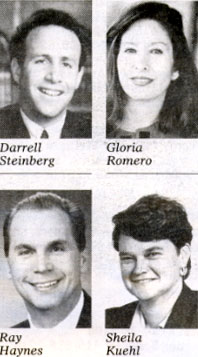|
 other groups on the issue to ensure that the
protections provided by the bill do not create serious conflicts with
public attorneys' other statutory and ethical duties as lawyers. other groups on the issue to ensure that the
protections provided by the bill do not create serious conflicts with
public attorneys' other statutory and ethical duties as lawyers.
The second Steinberg bill is AB 913, which is a
"spot" bill (i.e., placeholder) for legislation to
encourage/increase pro bono activity in California. Steinberg's
staff has been meeting with representatives of bar associations and
legal services providers from around the state to consider various
ideas and approaches to the problem of declining pro bono by
California lawyers, and will be amending his bill in light of those
meetings.
The decade-long battle over the so-called "baby
bar" examination, which has produced four bills passed by the
legislature and an equal number of vetoes from two governors, has been
rejoined with the introduction of AB 982 by Assembly Member Marco
Antonio Firebaugh.
As introduced, the measure would exempt students
of unaccredited law schools who obtained a bachelor's degree from an
accredited college or university with a GPA of 3.0 or better from the
statutory obligation to take the examination.
This time, however, Firebaugh and the bill's
sponsors have expressed a strong interest in working with the
Committee of Bar Examiners and the State Bar to seek a long-term
resolution to this divisive issue.
Two major bills of interest to the State Bar and
the state's lawyers were introduced after the legislative deadline.
One such important measure is SB 139 by Sen. Ray
Haynes, which proposes to eliminate the existing Interest on Lawyer
Trust Accounts (IOLTA) program for funding legal services in
California, and instead provide that the money from such accounts be
paid to the lawyers' clients.
Haynes created the new bill via amendment after
the 9th Circuit Court of Appeals handed down its Jan. 10 decision in
Washington Legal Foundation v. Legal Foundation of Washington, which
held IOLTA programs to fund legal services to be "a taking" (but
remanded to the lower court to decide the further issue of whether
plaintiffs were entitled to "just compensation").
Haynes is a long-time opponent of IOLTA funding
who has previously introduced legislation to eliminate the program.
Gloria Romero, who was recently elected to the
state Senate in a special election after a term in the Assembly, has
introduced SB 1194, a second post-deadline bill, which would permit
those who have been injured by persons practicing law without a
license to sue for damages and other appropriate relief.
The bill is sponsored by the Department of
Justice and is aimed particularly at the "trust mills" which have
been victimizing California consumers.
Other bills of interest introduced include:
 AB 1083 by
Assembly Member Patricia Bates, which is a clean-up measure to
legislation passed last year (AB 1761) establishing a regulatory
structure for paralegals in California; AB 1083 by
Assembly Member Patricia Bates, which is a clean-up measure to
legislation passed last year (AB 1761) establishing a regulatory
structure for paralegals in California;
 AB 935, by Assembly Speaker Robert Hertzberg, which would establish a
loan repayment plan for licensed attorneys who agree to practice in
designated public interest areas of the law;
AB 935, by Assembly Speaker Robert Hertzberg, which would establish a
loan repayment plan for licensed attorneys who agree to practice in
designated public interest areas of the law;
 AB 752 (Mike Briggs), which would require all advertisements for legal
services relating to home construction defects to include specified
information;
AB 752 (Mike Briggs), which would require all advertisements for legal
services relating to home construction defects to include specified
information;
 AB 1504 (Robert Pacheco), which would require all contingency fee
agreements for legal services to include the actual hourly rate the
attorney charges for services;
AB 1504 (Robert Pacheco), which would require all contingency fee
agreements for legal services to include the actual hourly rate the
attorney charges for services;
 (Sheila Kuehl) would extend until 2004 the State Bar's authority to
assess fees of the lawyers it regulates and would maintain the maximum
fee the bar may charge at the current $395 per year; and
(Sheila Kuehl) would extend until 2004 the State Bar's authority to
assess fees of the lawyers it regulates and would maintain the maximum
fee the bar may charge at the current $395 per year; and
 SB 479 (John Burton) would create an attorney diversion program for
State Bar members with substance abuse problems.
SB 479 (John Burton) would create an attorney diversion program for
State Bar members with substance abuse problems.
|

